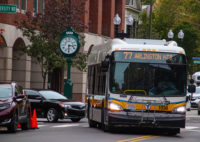State DOT Leaders Discuss Future of Transportation

Tudor (left) and McGrath discuss their pandemic experiences. Photo courtesy of Garver
The future looked bright for the transportation sector as leaders find new ways of doing business, according to state DOT directors from Arkansas and Mississippi during a virtual panel held Nov. 19 .
Despite the pandemic’s onslaught, Arkansas DOT director Lorie Tudor and Mississippi DOT director Melinda McGrath agreed that positive changes are coming. “There’s good things happening and things are changing,” Tudor said. “The future will be even better.”
Hosted by state chapters of Women in Transportation, the virtual event, "Driving the Future: A conversation with the women leading Arkansas and Mississippi’s DOT,” was moderated by Jerry Holder, director of transportation at design firm Garver.
When COVID-19 first hit the U.S., Tudor said her office expected a $300-million impact, with most agency revenue being consumption-based. While Arkansas traffic experienced a 40% drop in April, the DOT lost $10 million in revenue. However, pre-pandemic traffic volumes have returned, the director said.
Mississippi’s DOT only experienced a major traffic drop in April, with a $20 million to $30 million loss, said McGrath. “Now we’re back,” she noted.
Transportation agencies are learning valuable lessons from the pandemic’s effects, both leaders said. “Engineers aren’t always known as being flexible,” McGrath said. “We’ve learned to not draw a line in the sand. We’re adapting and accommodating the needs of our staff.”
McGrath added that many of her staff members are more productive now that they’re working remotely. “We asked why, and they said, ‘Because people like you don’t come by and bother me at my desk,’” McGrath joked. She added that work quality and productivity levels may be up because employees are no longer working in one eight-hour seating. “Maybe they’re working four hours in the morning, then being with their families, and doing four more hours at night.”
Asked about the biggest challenge for the industry over the next five to 15 years, both speakers stressed recruiting and maintaining staff.
“We’re having a difficult time recruiting employees, especially engineers,” Tudor said. “We need to get into schools earlier. Transportation checks all the boxes. You get to problem-solve, it’s exciting… you can be involved in building something. The baby boomers - we’re retiring. We need you to get on board.”
“We need to reach people early and often,” echoed McGrath. Many people don’t understand exactly what employees do at the DOT, she said, so it’s important to explain to young people the roles and positions at the DOT, and what it’s responsible for. “We need a seasoned staff that understands what we need out of a project. You only get that being able to retain staff for more than five years.”
McGrath emphasized it’s crucial to explain to legislators the importance of having a strong, competent government workforce and to advocate for realigned salaries. Pay can often be a big hurdle in recruiting and maintaining staff, she said.
“There is nothing more rewarding than being a public servant and helping people out. You get to do a lot of good things,” McGrath said. “Government needs you - it needs smart, hardworking people who can articulate well and make sure the public trust is protected.”
Both states are making large strides when it comes to transportation. On Nov. 3, Arkansas passed Issue 1, which will add $200 million to the funds available to the state DOT. Arkansas voters originally approved a temporary half-cent sales tax in 2012 to maintain Arkansas’ roads and streets. DOT used those funds for Connecting Arkansas, a program of highway widening projects.
“We were successful in delivering that program,” said Tudor. “Voters could see that we can deliver on the progress that we made. The Renew Highways Program is the new project that Issue 1 will help fund. State programs will help improve your roads, make them safer, improve mobility and bring jobs into the state… Arkansans determined that they wanted to continue this revenue source for the roads.”
Meanwhile, Mississippi passed the Lottery Tax, with the first $80 million of proceeds to go to the state’s DOT. McGrath said this money will boost paving projects and street repairs. “But the sunset is in 2028,” McGrath said. “We need to do a better job of going out and explaining what we need [to legislators].”
Both speakers agreed that women are getting into the transportation business now more than ever, and that they need to support each other in career advancement. There was a time, McGrath remembered, that she had a male employee who couldn’t believe he had to answer to a woman.
“Now it will be easier" for the women who follow, McGrath said,



